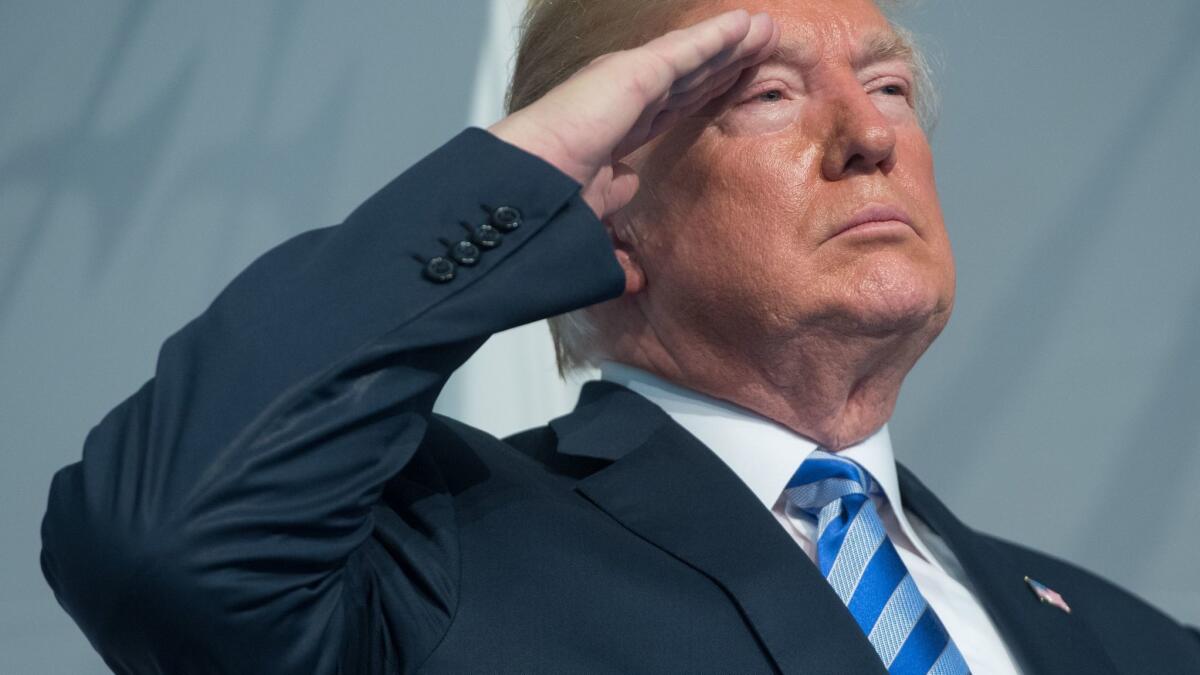Editorial: Trump doesn’t think he’s above the law. He thinks he <i>is</i> the law

- Share via
Donald Trump once said during the 2016 presidential campaign that he could stand in the middle of Fifth Avenue and shoot someone, and still not lose any voters. And who knows? He may have been right.
Now that he’s president, could he also be protected from prosecution for pulling the trigger? Trump seems to believe so. That’s the essence of his assertion Monday morning that he has the absolute right to pardon himself.
Of course the context of his tweet was not a New York shooting but the ongoing special investigation into alleged Russian interference in the election. But the claim would seem to be no more or less valid for one presidential action than any other. If federal prosecutions are merely extensions of the president’s executive power, and if he could pardon himself as readily as he could pardon Joe Arpaio or Dinesh D’Souza, then it’s hard to see how he could be held to answer for breaking any federal law. Prosecute me, Trump seems to be saying, and I will just pardon myself and we’ll move on. So why bother prosecuting me in the first place?
In this view the president is like kings and emperors of ages past. By definition, he cannot violate the law. It’s not that he is above the law. As president, the argument goes, he is the law.
That notion is foreign and unpardonable — a structurally monarchical presidency constrained by nothing but the president himself. White House Press Secretary Sarah Huckabee Sanders’ later statement that “no one is above the law” offers little comfort, given that the president apparently believes that he is.
It’s not that he is above the law. As president, the argument goes, he is the law.
Trump is correct when he says that there are some legal scholars who back his assertion that the president can pardon himself. It is a claim not yet vetted in the courts because there has never before been a president willing to push the question very far. Richard Nixon fired his prosecutor but ultimately resigned because he knew he faced impeachment, not because of impending criminal prosecution. President Gerald Ford did pardon Nixon and shielded him from criminal accountability for his actions, but by then Nixon was out of the White House, no longer a danger to the nation or a threat to the rule of law or the checks and balances of government.
So perhaps impeachment, replete with the trappings of legal procedure but at heart a political action, is the proper check on the otherwise unfettered power of a president over how, or even whether, the law is enforced? But then there is no check at all on any president who is sufficiently popular that he can, say, shoot someone on Fifth Avenue without fear from Congress, because it’s not in the political interests of the GOP majority to stand up to him. That would make us a nation of men (and women) and not of laws. And that’s not what we are.
Follow the Opinion section on Twitter @latimesopinion and Facebook
More to Read
A cure for the common opinion
Get thought-provoking perspectives with our weekly newsletter.
You may occasionally receive promotional content from the Los Angeles Times.






